Old Farnhamians' Association
Obituaries & Tributes
![]()
Sir Jeffrey Tate CBE (1954 – 1961)
A
Personal Recollection of Jeffrey in
School Days and later, by Ian Sargeant (1955 – 1962)
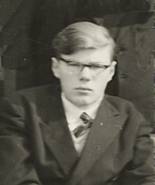 Jeffrey
Tate was recognised as being an extraordinary boy from the start of his days at
FGS. Already suffering from his considerable physical disability, he rarely
mentioned his condition when talking to other boys. He coped to the utmost of
his physical ability and joined in all the activities he could. He cycled to
school and once asked if I could help him pump up his bicycle tyre, a task that
was just beyond his limits but something I was pleased to do. He was a year
older than I and we therefore only met in extra-curricular activities,
particularly music-making.
Jeffrey
Tate was recognised as being an extraordinary boy from the start of his days at
FGS. Already suffering from his considerable physical disability, he rarely
mentioned his condition when talking to other boys. He coped to the utmost of
his physical ability and joined in all the activities he could. He cycled to
school and once asked if I could help him pump up his bicycle tyre, a task that
was just beyond his limits but something I was pleased to do. He was a year
older than I and we therefore only met in extra-curricular activities,
particularly music-making.
The whole school became quickly
aware of his prodigious musical talent. In 1955, soon after starting at FGS, I
went to a school social at the Congregational Church and Jeffrey was the
pianist who played for some of the games that required music. As a young
pianist myself, I was astonished at his virtuosity, particularly when I asked
him if he had ever taken any exams and he said he’d taken Grade 4, my level.
And I think that was probably the only practical music exam he took before
leaving school, though he took O Level Music in 1958 as one of his nine GCE
subjects, all subjects taken a year earlier than normal. He was 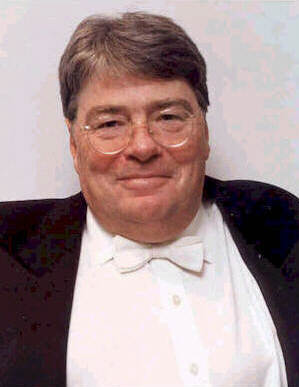 therefore
largely self-taught on the piano since I believe he took lessons only
intermittently with a Miss Robins who lived near us.
therefore
largely self-taught on the piano since I believe he took lessons only
intermittently with a Miss Robins who lived near us.
Alan Fluck, our music master, gave
Jeffrey great encouragement and many opportunities to perform as a pianist, a
cellist and a singer. We sang the bass line together on many occasions in the
choir and the “Octet”, which always performed as a small group during the Carol
Services (see photo). He had a part in The Charlatan, an opera written by Alan
Fluck and also in the Coolibah Tree.
Talking to Jeffrey was more like
talking to a friendly school master than another schoolboy who was only 12
months older than I was. He wasn’t condescending in attitude, but he was
knowledgeable and interesting.
I thought I never stood a chance of
being the school pianist whilst he was around, but luckily for me he started
playing the cello and that gave me a chance to accompany the choir and the
orchestra on occasions.
Jeffrey started a play reading group
at the Castle Theatre on Sunday afternoons, attended by about a dozen of us. I
think I was the only FGS boy to join other than Jeffrey himself of course. I
particularly remember how he grabbed the part of Lady Bracknell in The Importance of Being Earnest and his
strangulated ejaculation of the famous line “A HANDBA-AG!!”.
Jeffrey left school in 1961, having
been school captain in his last year, and we heard occasional news of his
progress. He went to study medicine but the world of music called to him and
Alan Fluck, whom I met occasionally in later years, would let people know that
Jeffrey was accompanying opera singers and then, in later years, conducting
opera. And we watched proudly events such as the release of recordings he made
of Mozart piano concertos etc and the press articles that appeared praising his
interpretations.
By 1980 I was settled in
The last time I saw Jeffrey was at
Alan Fluck’s funeral in January 1998, at Guildford Crematorium. There were,
sadly, only 3 or 4 old boys present and the entire ceremony was over very
quickly with Jeffrey whisked away at the end.
I have been very fortunate to meet
some outstanding people during my career – Jeffrey Tate ranks as one of the
most inspiring people, someone that I knew during my early years and whose
career I was able to follow from a distance with pride and pleasure. Thank you
Jeffrey!
Ian
Sargeant
Saturday, 10 June, 2017
___________________
Derek
Bowtell (1945 – 1952) gives us his recollections of Jeffrey Tate
The Old Farnhamians’
Music Club was a joint venture with the School that existed with Alan Fluck’s
help when Jeffrey Tate was still at school. Jeffrey was a keen member who
travelled on coach trips to
The Music Club
also presented recitals in the School Hall one, arranged by Alan, being given
by Julian Bream. At another recital, performed by local amateur musicians,
Jeffrey was the piano-accompanist. He was much admired by the soloists who
appreciated his astonishing sight-reading, needing only a few bars of rehearsal
of each musical item, and to be reassured by Jeffrey that everything would
be all right a short time later at the performance in the evening. Of course,
it was!
When Jeffrey was
making his name as a conductor internationally he returned to conduct a
production of ‘La Clemenza di Tito’, by Mozart at
When discussing
his interpretation of Schubert’s 9th Symphony with the London Symphony
Orchestra that he had just conducted at the Barbican on another occasion, he
expressed the view that the Symphony’s faster passages needed to be played at a
tempo that was comfortable for his players. This was an example of his
attention to detail that marked his performances, and was pointed out in the
obituaries in national newspapers, the interpretation of Wagner’s ‘Flying
Dutchman’ lasting ten minutes more than the norm being a case in point.
More recently it
was a pleasure to listen to Jeffrey in
We all now have
the opportunity of hearing again on our website Jeffrey’s memories with Alan at
the first ‘400 Trust’ Lecture in 1988. We may miss the physical presence of a
remarkable man, but many pleasant memories will remain.
Derek Bowtell
Sunday, 25 June, 2017
Press Obituaries:
Please email to the webmaster any additional
recollections or tributes you have of Jeffrey Tate.
________________
WNB (“Bruce”) George 1928 – 1932
Died 27 January, 2016
To read a special obituary to Bruce
George, please click here
________________
Guy Bellamy
Died 18
July 2015
Guy
Bellamy (1948 to 1952) left FGS to do two years national service in the RAF,
spent mostly in
Throughout this time he was writing
novels in his spare time but failing to get one accepted. In 1977, by which
time he was a sub-editor on Rupert Murdoch’s The Sun, he had a novel The
Secret Lemonade Drinker, instantly accepted by a good publisher in
The first novel got outstanding reviews
from highly regarded critics such as Auberon Waugh (“A major new talent … I
laughed and laughed, reading it in a state of tremulous excitement which must
have been the nearest we novel reviewers come to an understanding of heavenly
bliss”) and Erica Jong (“One of the wittiest books I’ve read in years…”).
It reached number 4 on the best seller lists.
Guy wrote 12 novels. One of his most
successful, The Nudists, was in the best seller lists for many weeks
reaching number 6 and being named one of the Sunday Express’s four novels of
the year. Another book, The Mystery of Men, was made into a two-hour
film by the BBC and screened in 1999 with Warren Clarke and Nick Berry.
Over the years, Guy regularly wrote
articles and short stories for newspapers and magazines and done book reviews
for The Observer and The Mail on Sunday.
He was a prolific writer who may
have been spurred to great achievements by the closing remark of F.A Morgan in
his final school report…”Well, it’s too late now”!
This obituary is based on an article
approved by Guy in January, 2011
The Talented Mr Chandler by
Guy Bellamy
A
short story written for The Farnhamian and this website
_________________
Colin J. Williams P
(1960-1965).
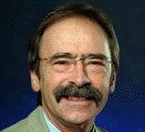
After leaving FGS, Colin obtained
a BSc in Mechanical Engineering from
In 1974 Colin started a small
company in
Colin developed expertise
in microclimate issues and applied this in many international building
projects including
Colin, with his wife Kathy,
daughters Megan, Caitlin, Bronwyn and son Michael, enjoyed a full life, whether
at his
Colin died on 11 October , 2104.
Brian
Williams
30 October, 2014
________________________
Brian Williams
PhD, FRAeS (1959-1965)
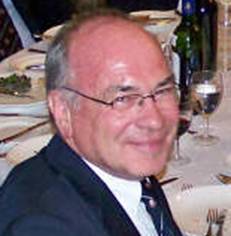
Brian came to
Brian settled
well and became influential in science lessons as his prowess developed. He
achieved outstanding academic results attaining 9 ‘O’ Levels and 5 ‘A’ Levels,
which included distinctions in Pure & Applied Mathematics.
Brian’s career
will be dealt with elsewhere but his affection for the school, the staff, and
his chums lived on as he embarked on an outstanding career; always a loyal OFA
Member, he was invited to become the president of the Old Farnhamians’
Association, and served as its secretary for eight years through to its closure
in 2022; Brian had by then taken on the mantle of chairman of The Farnhamian
400 Trust, where he was a thoughtful confidant in the preparation and
commissioning of the 400 Trust Memorabilia Museum which is now housed in Room
304 at Farnham College. All this demonstrates his remarkable level of service
to the Old Boys Association, which was all carried out with a delightful
calmness Brian showed in all that he tackled.
How best to sum
up Brian? It is tricky because what is clear is that despite his outstanding
academic achievements and professional success, he just remained that quiet
unassuming person it was my absolute privilege to have known. The world is a
lesser place without him.
Roger
Edgell
22 September 2025
____________
I had returned
from
It was years
later through the old Farnhamians Association that I again met Brian at OFA
dinners, and a close friendship developed over a number of those years, not
least because of the significant number of meetings at his home in Trebor
Avenue concerning the Old Farnhamians. In addition helping
We heard that
Brian was highly respected in his role at the RAE – Royal Aircraft
Establishment - and my wife and I stayed with him and Yvonne many times where
we saw how important the Old Farnhamians and college progress were to him, as
was the 400 Trust later when he became Chairman. In 2018 he, with
Yvonne, played a significant role in our wedding, not least the invention of a
scone tree there to the puzzlement of all – the recipe for his wonderful scones
remaining a closely held secret.
During all those
years what stood out was his modesty of achievement, very significant in the
world of aeronautical mathematics. I believe he was a member of the Royal
Aeronautical Society, maintaining contacts with both school friends and work
colleagues, and above all helping everyone in sight anywhere near him with
Yvonne, most especially his growing family.
What a great calm
conversationalist he was, and how positive a person was Brian to all he knew
and life as it progressed. A wonderful and close friend, there are few
people with the depth and modesty of achievement than Brian, and his friendship
will be really missed. Yvonne and his family of which he was so proud
will carry on his approach to life to the benefit of all who knew him. If
there is anyone who has earned a place in heaven, it is surely Brian who put
others first in his world and helped them all his life.
Richard
Phillips
____________
I was a school
contemporary of Brian Williams. Most
school students drift between groups, but it was my fortune to find that Brian and
I thrust together alone in our final year at school. As mid-teenagers, and with
Brian’s brother Colin, we rapidly engaged in a range of activities including
additional education courses, Saturday work experience, car ownership, travel
and maintenance (unusual then), including scuba diving holidays (we made our
own equipment), and obviously the usual teenage social encounters. There was no group leader, and all ideas
(many Brian’s) were pursued by consensus and with mutual trust. We did some good things, we did some really
silly things and we didn’t always get away with it, but we sure did learn! In
all things, Brian’s intellect and persona shone through. He was undoubtedly one
of the most academically gifted people I have ever met and he played a key role
in my formative years. Thankyou Brian.
Our relationship
sustained throughout our separate university courses and again into our careers
in RAE Farnborough. We worked in
different fields, and Brian’s academic prowess found its niche in Aero Dept.
His work led directly to improvements in aeroplane efficiency and safety,
recognized not only by colleagues but across the aircraft industry. Our work paths only crossed irregularly, but
whenever we met our initial eye contact reassured me that we retained a mutual
understanding. I’d like to hope he felt
the same. I, at least, knew the
encounter was going to be pursued with Brian’s usual incisive logic, based on
irrefutable facts, honest without any dressing, subterfuges, party lines or
embellishment. He treated all as his equal and was always patient to keep
everyone fully engaged.
Others have also
spoken of Brian’s gifted intellect, but it is in rare combination with his
honest even engagement and patient demeanor that made him a truly remarkable
person. I am privileged to have known
him and mourn his loss with all of you.
Howard
Torode
________________________
Bill Wallis (1947 – 1955)
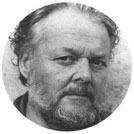
|
|
Bill Wallis (1947 – 1955) was head boy in his final year
and left FGS to go to |
|
Bill later appeared on Peter Cook
and Dudley Moore's famous TV series Not Only But Also, in which they all sang
a silly song about Alan A'Dale. (It repeatedly went ‘Alan A’Dale, Alan
A’Dale, this is the tale of, Alan A’Dale…’, but we never actually got to hear
the tale of Alan A’Dale). In 1969, he played Prime Minister
Harold Wilson in Mrs. Wilson's Diary (1969), a stage show based on a regular
feature in Cook's satirical magazine Private Eye. Bill also had several roles
in Blackadder's various incarnations, notably as the revolting jailer Ploppy,
son of Ploppy.… He later had a role in several series of Dangerfield, a BBC
medical drama. Other notable roles were in Yes, Prime Minister (as a
chain-smoking Sports Minister who is promoted to be Minister of Health) and
The Avengers. Bill has taken leading roles in
rep at Bill died on 6 September 2013 at
his home in Posted here
Wednesday, 18 September, 2013 Obituary in The
Guardian on 17 September 2013 – Click
here |
|
________________________
This is a tribute to a much-loved
Science teacher of FGS who died on 30 July 2012 at the age of 88.
A very sad aspect of this is that the writing of this tribute was almost the
last act of his son Matthew
who tragically died on the day of
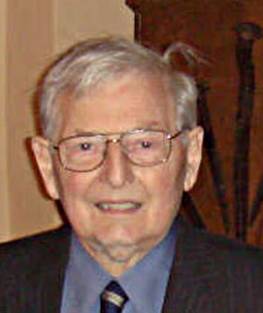
He attended
In 1944 he joined the
Royal Naval Volunteer Reserve and after training at
After coming home he
returned to
He met Faye at a party
in Ashford where she first saw him doing a handstand balanced on two beer
bottles – she asked him “does it hurt?” and he answered “not yet!”
Stanley and Faye were
married on the 29th of December 1949 in Hythe.
Shortly before the wedding he lost one of his front teeth while playing
hockey for Ashford. He didn’t have time
to go to a dentist before the ceremony so Faye said to him “whatever you do -
don’t smile”. Needless to say he
couldn’t help but smile.
Following their marriage
At Farnham Grammar
School he was the Head of Science and contributed hugely to the life of the
school, among other things leading one of the Houses (Harding), helping to run
the combined cadet corps, arranging the lighting for school productions, and
leading a school party on the Surrey Schools Cruise around the Mediterranean on
the SS Nevasa – a converted troopship. A
party from the Girls’ Grammar School were also on the trip which may explain
why at school assembly on the day the cruise departed the hymn chosen was - “For Those in Peril on the Sea”!
He taught at
He retired in 1990 but
remained busy in his retirement. Faye and Stanley enjoyed musicals and ballet
and made fairly frequent trips to
He also enjoyed looking
after his grandchildren Sam, Catherine and Amy of whom he was immensely
proud. They all enjoyed their many trips
to the theatre with Granny and Grandpa and they were also regulars at school
productions, carol services and Christmas and summer fairs.
Howard and Matthew have
fond memories of family holidays in Devon and
Faye has many happy
memories of their 62 and a half years’ of marriage: celebrating Gold, Ruby and
Diamond anniversaries. Following their
Ruby wedding in 1989they spent 3 days in May in
Since January this year
Everyone who knew
Matthew Owen
Posted Monday, 17 September, 2012
________________________
This is the tribute by Chris Fitch to
Stanley Owen’s son, an old boy of the school,
who sadly died less than three weeks after his father, on 16 August, 2012
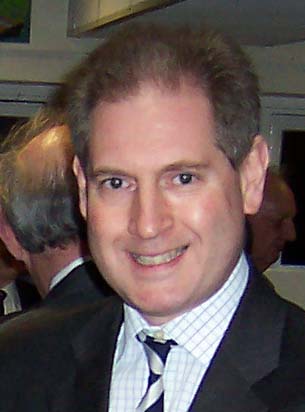 Matthew
was born in
Matthew
was born in
Matthew first went to
school at
I didn’t know Matthew at
Church House but I know that one of his most enduring memories was when Farnham
and his school were both flooded.
I first met Matthew in
November 1971 (over 40 years ago) when I joined the Grammar School as a
“newcomer” – he was the person who, unprompted, “took me under his wing” and
helped me make friends and become part of the School.
Matthew was very good
academically at School and I know that he remembered his School days most as a
very happy time when, as well as setting himself up for the world of work and
being a grown up, he had fun and made lifelong friends. On the news of
Matthew’s passing two friends from that time, who had not seen him since,
commented - “even in those early days, over 40 years ago, we all knew Matthew
as a calm gentleman”; “He was a truly great person and one of the nicest and
kindest boys I have ever met”. These are words that ring as true today as they
did then. He often spoke fondly of his school days and regularly attended the
Old Farnhamian’s reunion dinners.
The school kindled
Matthew’s love of sport – he represented the school at many sports including
his favourites Hockey (like his father) and
Feeling deprived of
sport after leaving school he made good use of the newly built Farnham Sports Centre and won the Farnham Town Volleyball competition one
year with a team of ex sixth-form friends. He also took up golf and I remember
many summer holidays when we would play golf every afternoon and evening in
In 1977 he left home to
attend Bishop Otter College, part of
the
After university he had
various jobs ranging from part time work at a glue factory to a short stint as
a hospital porter. One job he enjoyed was working for a company that decided
whether to air Australian TV shows in
Matthew kept work and
home life quite separate, once he had stepped off the train he didn’t really
want to talk about it. Helen and his family often joked that he was really a
spy; but his excuse was that he had signed the Official Secrets Act. So it was
so nice for the family to receive so many tributes from his work colleagues,
saying how well liked and respected he was for his professionalism and
expertise and that his modesty, good humour, kindness and calmness came shining
through at work. These lovely tributes have given his family great comfort at
this sad time.
On his return from
university he asked Helen, who conveniently lived opposite, out for a drink
which was soon followed by “but you will have to drive”. She should have known.
Although Matthew was a member of a winning Lottery syndicate, meeting Helen (or
his parents deciding to move in opposite) was undoubtedly the luckiest day of
Matthew’s life. The romance blossomed and three years later in 1984 they
married (a day I personally remember as Matthew’s best man). They moved into
their first home in Holybourne where Sam was born four years later and in 1990
they moved to Wrecclesham and six months later Amy was born.
Matthew absolutely
adored his children and was a fantastic dad. He threw himself into fatherhood
in every way. As the children grew up he took an active part in their school
life and hobbies. Both Helen and Matthew joined the PTA at the children’s’
school and became very active in helping to organise fetes and fairs, building
adventure playgrounds and gardening. Helen and Matthew even dressed up as Punch and Judy when the school
participated in the local carnival, guess which one Matthew was? Later on he
became a parent governor and put his expertise in finance to good use. When Sam
and Amy went to secondary school he would spend endless hours helping them with
their homework.
When Sam became interested
in football Matthew sacrificed his Sunday mornings driving to all corners of
He shared his love of
music with the kids too. When Amy decided to take up the violin he would
patiently help her to learn new tunes, in particular the unforgettable Memories from Cats. As they got older
Sam and Amy would invite him to go to various gigs and festivals. They have
both downloaded his hundred favourite tunes, so his music will live on. He even
sent Amy and Charlotte a selection of motivational tunes to keep them going
during the final months preparing for their degree show.
Amy inherited Matthew’s
love of painting; he found it a great form of relaxation. He beamed with pride
when he walked round Amy’s degree show and he wanted to purchase one of her
final pieces if no one else bought it.
He was so proud that
they had done so well at university, that Sam was enjoying living and working
in
Apart from his family
Matthew had many other passions in life. I have already talked about his love
of music. He had a large collection of guitars and a ukulele and would spend
many hours strumming away. He had a great talent of being able to learn new
tunes from just listening to them a few times. He would often entertain his
friends at dinner parties by organising singalongs, with him on the guitar. He
even wrote his own music and sent it off to a record company, but sadly was not
successful.
His other main passion
was bird watching, which Helen and he combined with their love of walking. They
had both missed doing this over the last year or two.
His latest hobby was the
vegetable garden that he and Helen built together. He got quite obsessed with
it to the extent that he would go straight out to check on the vegetables when
he returned home from work. He had even been known to play his guitar to them
to encourage them to grow. He had been very frustrated lately that he had not
been able to attend to them himself.
Matthew had such a
thirst for knowledge, reading and crosswords. He could retain and remember so
many facts which amazed us all at times. He certainly will be missed at quiz
nights (who wouldn’t want Matthew as their first choice in their quiz team?).
It was not just facts and figures – you could always depend on Matthew to
provide you with sensible and dependable advice and help as a friend.
Finally, Helen and his
family have received so many cards and letters that it is quite clear that
everyone thought that Matthew was one of the good guys. We all have fond
memories of him and there are too many words to express how we feel about him,
he touched so many lives and was such a lovely, kind, caring, reliable, calm
and modest man who will be missed deeply by us all and will live on in all of
our memories and through his lasting legacy – his loving family.
Chris Fitch
Posted Monday, 17 September, 2012
________________________
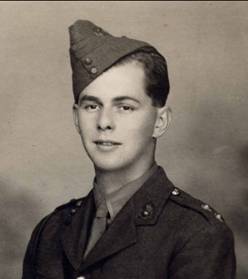 The son of an Assistant Fish Quay Master in
North Shields, George Carroll won scholarships to high school and to
university, where he completed a degree in Electrical Engineering. As
well as being academically gifted, he was a talented all-round sportsman and
amateur actor. George was taking a second degree in Mechanical
Engineering in November 1939 when he volunteered for Army service.
The son of an Assistant Fish Quay Master in
North Shields, George Carroll won scholarships to high school and to
university, where he completed a degree in Electrical Engineering. As
well as being academically gifted, he was a talented all-round sportsman and
amateur actor. George was taking a second degree in Mechanical
Engineering in November 1939 when he volunteered for Army service.
Having passed out second in his Officer
Training cohort, George joined the Royal Engineers and was posted to
On the advice of his doctors to take up an
occupation he loved, George became an actor and achieved success in repertory
and on the
George began teaching at
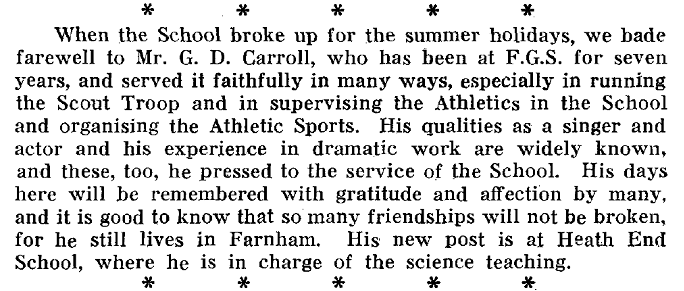
He put down roots in the town by
designing and building his own bungalow in Sheephouse, where he and Betty had
three children.
In 1957 the opportunity for advancement came
with a position at a pioneering Secondary Modern School in
Active in retirement, George lived by his
teaching that boredom was not necessary - there is always something to
do. He volunteered at a local primary school to help children
with reading, provided transport for people with disabilities, took up and
excelled at golf, designed and installed wooden double-glazing
throughout his house. He was still tending the 200 foot garden until
he was 90, when difficulties with balance and failing sight took hold. Despite
increasing frailty he attended the weddings of all three
grandchildren before his health failed and he passed peacefully
away.
George enjoyed his membership of the Old
Farnhamians’ Association; although he was rarely able to attend meetings, he
was always pleased to read the newsletters. He retained lasting
happy memories of his time at
Submitted by George’s daughter Susan Hudson
30 May 2012
Daily Telegraph Obituary 6 June 2012 - click
here
________________________
John Robert Edmunds OBE
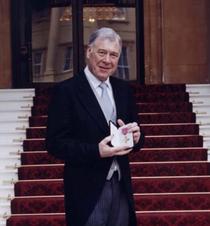 John Robert Edmunds was born in
John Robert Edmunds was born in
He entered
In 1956 he achieved
passes in 7 subjects for the GCE (Ordinary Level), added Biology in 1957 and
Physics and Chemistry in 1958. In total he passed 10 subjects at ‘O’ Level and
Geography at ‘A’ Level. An excellent academic record!
During his teenage years
he had several girl friends who allegedly he told his name was ‘Jim’, so that
his sisters would not find out! He was a keen member of the local Young
Farmers, where he acquired his first taste for agriculture.
On leaving Farnham
Grammar School John started an HND in Agriculture at
He married Margaret in
1966 and would have celebrated his Sapphire wedding anniversary in 2011. He has
three sons Roger, Robert and Peter three daughters-in-law Sarah, Teresa and
Rachel, and two grandchildren James and Amy who all loved him very much.
John was very dedicated
to his work and was awarded the OBE in 1999 in recognition of his achievements.
However, away from work he was quite a different person and definitely had a
fun side. His favourite occupation was to sit on a sunny terrace with his
friend Martin sipping wine or drinking beer and watching the world go by. This
often took place in
John always had
agriculture in his blood and during his retirement loved to get stuck in on
Roger and Sarah’s small-holding at Gatehampton - nobody else “knew how to do it” according to John. John was always willing to
help anyone who needed it; in fact he asked that his epitaph be “he only tried
to help”. John was always active right to the end; he enjoyed long bike rides
in the Oxfordshire countryside accompanied by Margaret. He loved Inspector
Morse books and had almost read all of them. The Bear Pub was his favourite in
John was suddenly taken
from his family whilst in
Tribute submitted by Cyril Trust
Thursday, 14 April, 2011
________________________
Peter Eric Larby
Peter was born in 1927. With his twin sister, Freda, he spent his
early years in the family cottage, near the Frensham Ponds Hotel. Later the
family moved to Churt and he attended the village school. He successfully
passed the entrance examination to the
At FGS, besides his academic studies,
Peter was a fine all round sportsman. On the games field he excelled in soccer,
cricket and athletics. In fact he held the 110 yards hurdle record for many
years and ran for the Surrey Grammar Schools.
Following his time in the 6th form, he
gained a place at St Mark and
It was here that he met up with Michael
Jacobs, who later was Best Man at Peter and Pearls' wedding, which was held
here at
After the forces, he took up his place
at "Marjons" college, gaining his B.Sc degree and teaching
qualifications. He then returned to Surrey and did indeed marry
Peter's first appointment was to
It was then, at a chance meeting with
his 'old' English master, that Harold
Beeken suggested that Peter might consider applying for a vacant mathematics
position at FGS. Peter did, and he was appointed by George Baxter, to teach
Mathematics and help with games. It is interesting to note that Donald
Nicholson, also an old boy, was already on the staff of FGS. So in 1956, Peter
and family returned to Farnham and moved to
On a personal note, I will always
remember Peter and Pearls' kindness and welcome to Farnham when I joined the
staff of the Grammar School in 1964. This was indeed a great help and support
for a young master settling in.
In the classroom Peter was a very
effective and successful teacher, whether teaching Pythagoras to form two - or
Calculus in the 6th form. Outside the classroom, on the games field, he soon
became master in charge of the 1st XI soccer team that had much success over
the years. He also played cricket for Farnham in the Park for many seasons. At
school many enjoyable Thursday evenings were spent playing cricket for the
Masters' XI. The opening batting partnership of Larby and Foster was formidable
indeed.
When he stopped playing cricket, it was
onto golf, bowls and then sketching and painting. However when he wasn't
standing in front of a blackboard or on the games field he was never happier
than in his garden – potting up, planting, weeding and mowing the lawn. Much
time was spent in his beloved greenhouse.
Peter preferred and enjoyed teaching
the whole age range from the first to the sixth form. So in 1973, not long
after FGS became a 6th
Peter was a man of many
talents and interests. He led a very full and rewarding life. Kind and
generous, he was a quiet gentleman. He will be remembered with genuine
affection by us all.
(This is the tribute that
was delivered at the
funeral on 2nd October 2008 by Peter’s
friend
and fellow staff member Hugh Batchelor)
Posted 24 October, 2008
________________________
Charles W Rees
CBE, FRS
One
of our most eminent old boys died on 21 September 2006.
Charles
W Rees (1939 – 1944) was born in
Charles was the Royal Society of Chemistry’s Tilden
Lecturer in 1974 and Pedler Lecturer in 1984 and received the (first) RSC Award
in Heterocyclic Chemistry in 1980 and the International Award in Heterocyclic
Chemistry in 1995. He was elected a Fellow of the Royal Society in 1974. He was
awarded an Honorary DSc by the
Charles
served the chemical community in many ways: he was the President of the Royal
Society of Chemistry from July 1992 for two years. He served on its Council and
many Boards and Committees at various times; he was Chairman of the Publication
and Information Board for four years. He was President of the Perkin (Organic)
Division of the RSC, and President of the Chemistry Section of the British
Association for the Advancement of Science. In addition, he co-edited three
major reference works: Comprehensive Heterocyclic Chemistry I & II, and
Comprehensive Organic Functional Group Transformations.
(adapted with permission from a tribute to Prof Rees
published in Arkivoc.)
Tributes
________________________
Gordon Webberley
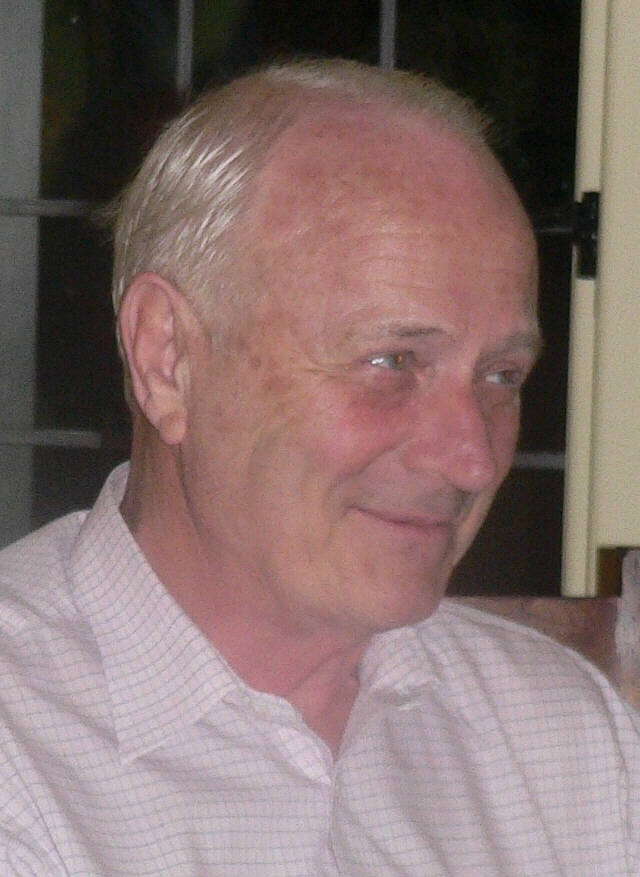 Gordon Webberley died on the
27th May 2006 after a year-long illness. He started at FGS in September 1941,
as a member of Morley House of which he eventually became House Captain. Gordon
took his General School Certificate in 1946 (with distinctions in English and
Mathematics) and his Higher School Certificate in 1948 (Physics, Chemistry,
Applied & Pure Mathematics) which was the same year he became School
Captain. During his time at school he participated in swimming, athletics, boxing
and rifle shooting and was the first holder of the Waverley Cup for .303 rifle
shooting. A member of the school choir and orchestra, he also became
Vice-Chairman of the Debating Society and the Vice-Editor of the school
magazine. He won various reading prizes and the George Sturt Prize.
Gordon Webberley died on the
27th May 2006 after a year-long illness. He started at FGS in September 1941,
as a member of Morley House of which he eventually became House Captain. Gordon
took his General School Certificate in 1946 (with distinctions in English and
Mathematics) and his Higher School Certificate in 1948 (Physics, Chemistry,
Applied & Pure Mathematics) which was the same year he became School
Captain. During his time at school he participated in swimming, athletics, boxing
and rifle shooting and was the first holder of the Waverley Cup for .303 rifle
shooting. A member of the school choir and orchestra, he also became
Vice-Chairman of the Debating Society and the Vice-Editor of the school
magazine. He won various reading prizes and the George Sturt Prize.
He was a keen
member of the Combined Cadet Force and became a Lance Corporal, then Sergeant
and finally CSM. He fully entered into practically all aspects of life at
He was an active
member of the 3rd Farnham Scouts, going on camps most years, including the
Jamboree in
Gordon joined
the Royal Artillery for his National Service where he was selected for Mons
OCTU and passed out as a Second Lieutenant. He saw service in
On completion of
2 years National Service he took and passed the H.M. Customs and Excise Officer
Grade exam in May 1951. His work took him to various parts of the
Throughout his working life, Gordon was an enthusiastic and talented
potter having started at Farnham School of Art in 1961. He exhibited regularly
at Farnham Art Society and was a committee member until 1984, in the last 7
years serving as Vice-Chairman. At this time his work took him
Brian Webberley
25 July, 2006
________________________
Squadron Leader Alan Fordham
Alan Fordham died on 12th October, 2005
aged 80 years. He came to FGS in 1962, initially to teach French and command
the CCF with the rank of Major. Later, he was appointed Dean of the Sixth Form.
When FGS gave way to
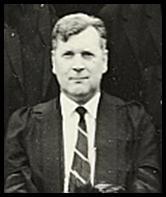 Alan was born on 24th March
1925. He joined the RAF from the Oxford University Air Squadron in 1943. He
trained in
Alan was born on 24th March
1925. He joined the RAF from the Oxford University Air Squadron in 1943. He
trained in
Here he taught Modern Languages, commanded the
Combined Cadet Force, and in 1968 became Dean of the Sixth Form. He became the
first of the senior tutors appointed to this position when
Posted, 02
November, 2005
There are also
reminiscences of Alan Fordham published on the Members’ News page of the
Web-Members'
Section.
![]()
GEORGE BAXTER MBE
Click
here
to go to the special page celebrating the life of George Baxter.
![]()
SQUADRON LEADER
Sidney
Wiltshire (1921 to 1926) was one of the school’s most distinguished old boys,
though there can be few of his contemporaries still alive to recall him. The
Daily Telegraph has given permission for our website to reproduce the
following obituary that was printed on 30th September, 2003:
Squadron
Leader
On
October 21 1929 Pilot Officer Wiltshire was flying an aircraft under
instruction with the No 2 Flying Training School in
After
extricating himself from the machine, Wiltshire found that his instructor,
Flying Officer H E Power, was trapped by his foot in the wreckage.
Although
under no illusions about the risk he ran, Wiltshire went back into the flames
to drag his companion clear, but was badly burnt on his face and neck.
Both
officers were flown to
The
citation declared: “Power would undoubtedly have lost his life but for the
prompt and courageous action taken by his pupil.” Wiltshire was invested with
the Empire Gallantry Medal by King George V at
Fourteen
years later, he was re-invested with the George Cross by the Governor-General
of New Zealand, Marshal of the Royal Air Force Sir Cyril Newall, at Government
House,
One of
eight children born to the founder of a company which supplied bicycles, and
later repaired motors, at Farnham,
Then,
at the age of 20, he followed the example of his two elder brothers and joined
the Royal Air Force on a short service commission. Four months later Pilot
Officer Wiltshire won the Empire Gallantry Medal. In December 1930 Wiltshire
was promoted Flying Officer and served with No 4, Army Co-Operation Squadron at
Farnborough. On completion of his service, he transferred to the RAF Reserve of
Officers.
It was
difficult to obtain employment in
In
September 1938, Wiltshire went to
He was
appointed to a temporary commission in the Royal New Zealand Air Force with the
rank of Flight Lieutenant, and posted to the Air Observers’ School at Ohakeal;
his brother Bill joined the RAAF while brother Norman, who remained at home,
was in the RAF.
In
January 1941, Wiltshire was posted to No 2 Squadron, based at Nelson. He then moved
to Wigram as Officer Commanding Signals Flight and the following year he was
promoted to Squadron Leader.
He
attended a course of the
In
September, he moved to Delta Station, near Blenheim, as
Wiltshire
was now aged 34, and had logged some 5,300 flying hours. Realising that there
was little prospect of employment matching his experience, he approached the
RAF, and was offered duties with Transport Command, provided that he reverted
to his reserve rank of Flying Officer and left New Zealand.
He
served with the RAF until December 1945, when he returned to
In
1960 and 1972, he attended the reunions of the Victoria and George Cross
association, on the first occasion as the sole living holder of the GC in
A
tall, good-looking man with a quiet sense of humour, he spent the last years of
his life in Hunterville, on the
Wiltshire
married, in 1940, Mrs Gretchen Guy (nee von Dadelszen), who predeceased him.
Posted 12
October, 2003
![]()
8 February, 2003
Dudley Backhurst (1943 –
1951), who died 27th January 2003, was born on 2nd December, 1932, in
In 1958 he married Sylvia. This was a very happy marriage of 44 years,
and they never threw anything at one another!
They had two children, - Merilyn and Graham, who now live in Sydney and
Nursling respectively. The arrival of
John and Merilyn from
Since retirement,
Towards the end of his life,
Tribute delivered
by Rev Sally Kerson at Dudley’s funeral on 6th February, 2003 in
![]()
20 December, 2001
Roger Downham (1955 - 1962)
died earlier this year from complications that developed following a road
accident.
Roger was born and raised in Farnham and lived his childhood in
His career was marked by professional success. He left school to study
Civil Engineering at
After his studies, Roger joined IDC Construction, rising to be Managing
Director and a director of the main board. He had responsibility for many major
projects, including the construction in 1980 of the prestigious Cambridge
University Press ‘
After a spell
of three years working for IDC in
Roger leaves
his partner, Sue Main, and 14 year-old son Alexander.
![]()
7th September, 2001
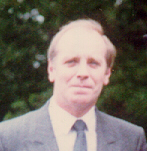 Geoff
Crawte died on 6th February 2001 after a short illness, aged 56.
Geoff was born in Farnham and lived his childhood at the family home in Alfred
Road, very close to the school. He went to
Geoff
Crawte died on 6th February 2001 after a short illness, aged 56.
Geoff was born in Farnham and lived his childhood at the family home in Alfred
Road, very close to the school. He went to
From school, he joined the National Westminster Bank and two years
later moved to the Electricity Board, where he worked for the rest of his
career, rising to be a Quality Analyst in Portsmouth.
When Geoff was taken ill in 1994, he was told that his condition was
serious and required an operation. He underwent major surgery and a long period
of recuperation. Following this experience, Geoff retired to Honiton in
Geoff's work has recently been recognised by the East Devon Special
Needs Action Group, where Geoff worked with many youngsters. The Geoff Crawte
Friendship Award has been established to recognise the contribution of those
who carry out similar work helping others.
Geoff married Carol in 1965 and they had two sons and a daughter.
![]()
29th August, 2001
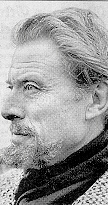 JACK GWILLIM, who has died aged 91, was a
character actor who appeared in the
JACK GWILLIM, who has died aged 91, was a
character actor who appeared in the
At the outbreak of the Second World War, Gwillim was a serving
officer in Hong Kong and
After testing for a wireless announcer's job, a BBC producer who
recalled his amateur acting in the Navy suggested he became a professional
actor. Gwillim took his advice and spent two years at the
Apart from various minor roles, Gwillim played Macduff to Ralph
Richardson's Macbeth as directed by Gielgud. He then toured with the company to
Australia, before returning to the West End in Peter Brook's production of
Fry's The Dark Is Light Enough (Aldwych, 1954).
In 1955 Gwillim joined the Old Vic Company when it was led by Paul
Rogers, John Neville and Richard Burton. His roles included Casca in Julius
Caesar, Banquo in Macbeth, Kent in King Lear, the Duke of Exeter in Henry V,
Brabantio in Othello, Hector in Troilus and Cressida, Friar Laurence in Romeo
and Juliet, Claudius in Hamlet, and the Duke of Buckingham in Henry VIII -
which completed Michael Benthall's five-year plan to stage all Shakespeare's
plays.
The critic Kenneth Tynan praised Gwillim's portrayal of Claudius as
"an iron-headed general at the awkward age - slightly ashamed of having
fallen in love - an original conception, of which Coral Browne's maternally
voluptuous queen makes splendid sense". Tynan described both John Neville,
who played Hamlet, and Gwillim as being like Donne's "grim eight-foot-high
iron-bound serving man" and "robber barons of childhood nightmares
come dragonishly to life."
Back in the West End, Gwillim appeared in The Right Honourable
Gentleman (Her Majesty's, 1964); Shaw's You Never Can Tell, with Ralph
Richardson as William the Waiter (Haymarket, 1966); Maugham's The Sacred Flame
(Duke of York's); and as Antonio in The Merchant of Venice (Haymarket, both
1967) with Richardson in the role of Shylock.
Among Gwillim's American stage appearances were in A Man For All
Seasons (1965-66); Maugham's The Constant Wife (1975); as Col. Pickering in Rex
Harrison's revival of My Fair Lady (1981); O'Neill's The Iceman Cometh and in
Rattigan's Cause Celebre. His last Broadway performance was in 1988, as
Among Gwillim's screen credits were as Brigadier
Of more than 50 film and television credits, among Gwillim's most
recent were Discoverers (1993); Reason for Living: The Jill
Jack Gwillim married firstly, in 1943, Peggy Bollard. She died in
1958. They had a son and a daughter. He married secondly, in 1969, Olivia
Selby, who survives him. They had a son.
Reprinted, with permission,
from the Daily Telegraph, 29th August, 2001
![]()
PAUL
FRENCH
Saturday, 23 June, 2001
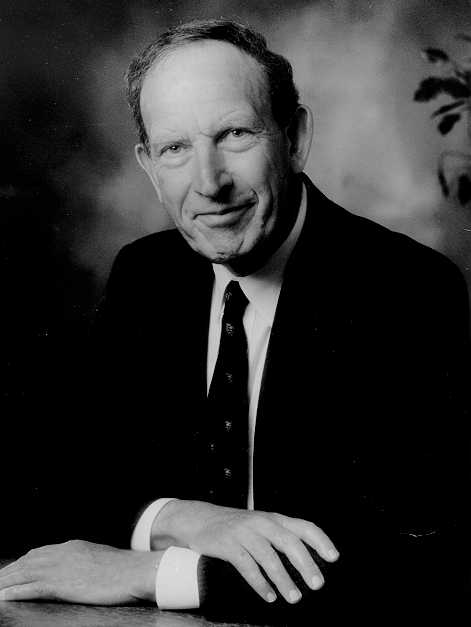 One of the unsung influential figures in the
recent history of Farnham died peacefully on June 5.
One of the unsung influential figures in the
recent history of Farnham died peacefully on June 5.
Paul Wilfred French (70) was the first principal of
Paul French arrived with an impressive track record. A
He was brought up in Haslemere
and attended
Superimposed on the endeavours
was the creation of an open access
With a great deal of hard work
and determination Paul French oversaw successfully the creation of the new
institution.
His computing skills ensured
that the college enjoyed a computerised administrative system that was in the
forefront of what was possible in the 1970s.
Above all Paul French was a man
of educational vision. He saw clearly
the excitement of the challenge of the new Sixth Form.
He understood the importance of
inner motivation of the student. Whilst
in no way under-estimating the importance of examination success and paper
qualifications he realised that education was much more than these.
He was concerned about
unexaminable factors - maturity of judgement, sense of humour, self control, a
sense of values, purpose and integrity.
With these in mind he felt the tutor-student relationship to be of great
significance.
His door was always open to
staff and students. He was at his most
relaxed in philosophical discussion, which he enjoyed greatly.
He was determined not to be
solely an administrator and taught mathematics and general studies throughout
his time at the college. He always
encouraged people to think about what they were doing.
In the 1980 he set up termly
meetings with staff and governors to discuss various aspects of the college's
life and philosophy.
By the late 1980s it was clear
that under the local management of schools, the compulsory devolution of most
financial management away from LEA to staff and governing bodies did not appeal
to Paul French and he chose to retire - a little early - at Easter 1990.
He left behind a flourishing
college which had laid to rest the fears of the early 1970s about the benefits
of re-organisation.
His successors were able to
build on the firm foundations which they had inherited.
In his retirement Paul French,
essentially a private man, continued to make music, play tennis and to teach
mathematics - his real love. In recent
years he was dogged by ill health.
He leaves his wife Dorothy, his
four children, Sally, Rachel, Helen and James, and 12 grandchildren.
A thanksgiving service will be held on Sunday 24 June at 3pm in St
Andrew's
(taken from the Farnham Herald, Friday,
22 June, 2001)
Personal Tribute to Paul French by Ian Sargeant
I didn't really know Paul during
his professional life, but I came to know him quite well when we returned to
live in Farnham in 1992. He was our church organist at
Paul was a slightly reserved and
very thoughtful man, with great compassion. It was self-evident that he was
very clever, but I know from our conversations that he also had a great
capacity to explain complex ideas with simple clarity - the stamp of a born
teacher. He had a good sense of humour and was generous by nature.
Paul will be greatly missed by
members of the OFA, people in
Ian
Sargeant
![]()
27 April, 2001
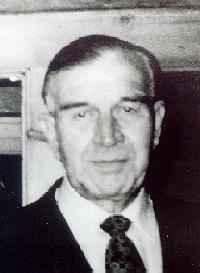 Norman
Patrick, who died on 20 April 2001 in
Norman
Patrick, who died on 20 April 2001 in
After the
war,
Based on an article in the Farnham Herald
![]()
January,
2001
Leslie Lord, who left the School in 1925, passed away
in January 2001 at the age of 92, having lived in Farnham for all of his life.
Leslie was born in 1903 and claimed the distinction of being the only person born
in the council offices in
He first went to school at St.Polycarp's in
He first worked for Swain & Jones for a short time
and then moved to Mardon & Ball and then to Tarrants, who were both local
building companies. During the second World War he was sent to East Africa to
form batteries of African troops, then he took a commission and moved to
Les never married, but took part in many local
activities. He played cricket for the Nelson Arms and in younger days played
snooker at the Farnham Institute. He was a long-time member of the Conservative
Club and was twice elected captain of Farnham Brightwells Bowling Club.
In his obituary in the 'Farnham
Herald' it stated that Leslie Lord had a great sense of fun, and will be
remembered for his kindness, courtesy and good humour and his talent for
friendship.
![]()
For
many years DUDLEY BACKHURST regularly
visited the
Redvers
Godsland was born in Middlesex in October 1901, but lived with an aunt in
Later
on in his school life he became a boarder and even stayed at the school by
himself during the half-term holidays. He was be-friended by Dr. Brown and his
family and at
He
married in 1932 and he and his wife ran a newsagents at
I persuaded him to attend the
![]()
GROUP CAPTAIN CEDRIC MASTERMAN
OBE DFC
17th May, 2000
The
death of this Old Boy was reported in the 'Daily Telegraph' on 17th May 2000
and it told the story of an extremely brave man. He played a part in the
ill-fated Norwegian Campaign of 1940 when he was sent to
Afterwards
he re-joined his squadron, then moved on to flying Hurricanes and in October 1941
took command of No.72 Squadron flying Spitfires in the celebrated Biggin Hill
Wing. He lead his fighters over France with great success and in 1942 became
Biggin Hill's Wing Commander before moving to Malta, where he doubled as No 2
on the fighter staff and ADC to Lord Gort VC, the island's Governor. With the
situation worsening he returned to flying and in two weeks his squadron shot
down 16 enemy aircraft, he increased his own total to 6 and led his men
shooting up aircraft on the ground , damaging enemy shipping, attacking trains,
petrol dumps and road columns. For this bravery he received his immediate DFC
(Distinguished Flying Cross).
Having
rested for much of 1943 as Wing Commander Training in
Cedric
returned home in May 1945 and after a spell at Transport Command he went to
Commonwealth Air Forces HQ at Iwakuni,
Cedric Audley Masterman was born
on September 25th 1914 and he boarded at the Grammar School from 1925 until
1928 and was a member of School House. Results show that he was a good athlete
and in 1928 he was Class 5 Boxing Champion and a member of the successful
School House Rifle Shooting Team. He went to
![]()
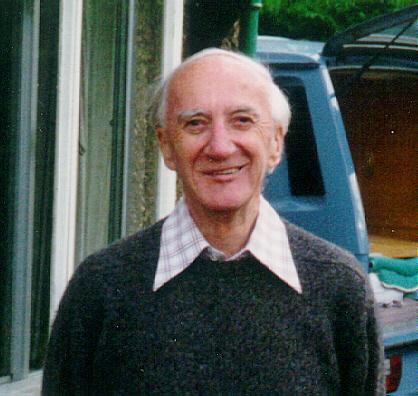 Mike Foster, who was an English master at
Mike Foster, who was an English master at
Mike (or
'Mac' as he was often known to his pupils) was born at Kirton in
During his
early years at the Grammar School he began the modern school library and, with
limited funds, he visited Foyles in
Mike
successfully combined with Alan Fluck to present music and poetry evenings and
also produced 'The Browning Version' at the Church House in Farnham, with most
of the furniture for the set coming from the Foster household. In 1960, he
combined with Alan Fluck to write and produce 'The Coolibah Tree', with the
lead taken by a renowned pupil, Terry Hughes, who later produced 'The Two
Ronnies' for BBC and 'The Golden Girls' for American audiences. For many years
Mike edited 'The Farnhamian' magazine at the school.
During
retirement Mike took a correspondence course in journalism and began to write
many articles, including holiday experiences that he and his wife Ann shared as
they travelled the world in their camper van. He became interested in
'benchends' and 'misericords', in fact in any wood carvings in churches and
cathedrals, and had several articles published in magazines. For a time he was
'Jim Clifford' who added humorous comment to the Frank Scribe page in the local
'Surrey and Hants News', and he had humorous short verses included in 'The
Sunday Times' for several years.
Over the
years Mike Foster played both football and cricket locally, the latter for
Farnham C.C. and several other local teams. He lived with Ann for over forty
seven years close to
To download a file of
Obituaries printed in The Farnhamian 2002 Edition, click here